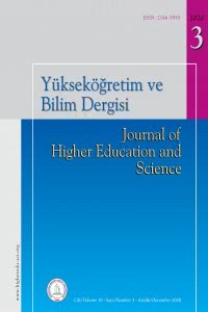Öğretmen Eğitimcilerinin Öğretme Kavramlarının Haritalandırılması: Fenomenografik Argüman Oluşturmak
Öğretime yönelik kavramlar, Öğretmen eğitimcisi, Fenomenografi
Mapping out Teacher Educators’ Conceptions of Teaching: Composing Phenomenographic Argument
Conceptions of teaching, Teacher educator, Phenomenography,
___
- Åkerlind, G. S. (2003). Growing and developing as a university teacher-variation in meaning. Studies in Higher Education, 28, 375-390.
- Åkerlind, G. S. (2008). A phenomenographic approach to developing academics’ understanding of the nature of teaching and learning. Teaching in Higher Education, 13(6), 633-644.
- Åkerlind, G. S. (2012). Variation and commonality in phenom- enographic research methods. Higher Education Research & Development, 31(1), 115-127.
- Arslanoglu, Ö. (2015). An examination of how the theory-practice relationship of pedagogy courses is conceived and perceived by the participants, and how management of education systems and faculties can enhance the quality of teacher education in Turkey (Unpublished Doctoral Dissertation). Durham University, London, United Kingdom.
- Bain, J. D., McNaught, C., Mills, C., & Lueckenhausen, G. (1998). Describing computer facilitated learning environments in higher education. Learning Environments Research, 1, 163- 180.
- Berry, M. (1981). Systemic linguistics and discourse analysis: A multi-layered approach to exchange structure. In M. Coulthard & M. Montgomery (Eds), Studies in discourse analysis (pp. 120-145). London: Routledge and Kegan Paul.
- Berry, A. (2007). Reconceptualizing Teacher Educator Knowledge as Tensions: Exploring the Tension Between Valuing and Reconstructing Experience. Studying Teacher Education, 3(2), 117-134.
- Booth, S. (1997). On phenomenography, learning and teaching. Higher Education Research and Development, 16(2), 135-158.
- Bullock, S. M., & T. Christou. (2009). Exploring the Radical Middle Between Theory and Practice: A Collaborative Self-Study of Beginning Teacher Educators. Studying Teacher Education 5(1), 75-88.
- Bullough, Jr. R. (1997). Becoming a teacher. Self and the social location of teacher education. International Handbook of Teachers and Teaching, (pp. 79-134). Dordrecht: Kluwer.
- Calderhead, J. (1981). Stimulated recall: A method for research on teaching. British Journal of Educational Psychology, 51(2), 211-217.
- Dall’Alba, G. (1991). Foreshadowing conceptions of teaching. In Ross, B. (Ed.), Research and Development in Higher Education, Vol. 13. Sydney: HERDSA (pp. 293-297).
- Darling-Hammond, L. (2006). Powerful teacher education: Lessons from exemplary programs. San Francisco: Jossey-Bass.
- Dinkelman, T., Margolis, J. & Sikkenga, K. (2006). From teacher to teacher educator: Experiences, expectations, and expatriation. Studying Teacher Education 2(1),5-23.
- Donche, V., & Petegem, P. (2011). Teacher Educators’ Conceptions of Learning to Teach and Related Teaching Strategies. Research Papers in Education, 26(2), 207-222.
- Engle, R. A., & Conant, F. R. (2002). Guiding principles for fostering productive disciplinary engagement: Explaining an emergent argument in a community of learner’s classroom. Cognition and Instruction, 20, 399-484.
- Fox, D. (1983). Personal theories of teaching. Studies in Higher Education, 8, 151-163.
- Schon, D. A. (1987). Educating the reflective practitioner: Toward a new design for teaching and learning in the professions. San Francisco: Jossey-Bass.
- Scott, P. H. (1998). Teacher talk and meaning making in science classrooms: A Vygotskian analysis and review. Studies in Science Education, 32, 45-80.
- Shulman, L. S. (1986a). Those who understand: Knowledge growth in teaching. Educational Researcher, 15(2), 4-14.
- Sjostrom, B., & Dahlgren, L. O. (2002). Applying phenomenography in nursing research. Journal of Advanced Nursing, 40(3), 339- 345.
- Timmerman, G. (2009). Teacher educators modelling their teachers? European Journal of Teacher Education, 32(3), 225- 238.
- Tondeur, J., Hermans, R., van Braak, J., & Valcke, M. (2008). Exploring the link between teachers’ educational belief profiles and different types of computer use in the classroom. Computers in Human Behavior, 24, 2541-2553.
- Vanassche, E., & Kelchtermans, G. (2016). A narrative analysis of a teacher educator’s professional learning journey. European Journal of Teacher Education, 39(3), 355-367.
- Van Driel, J. H., Bulte, A. M. W., & Verloop, N. (2007). The relationship between teachers’ general beliefs about teaching and learning and their domain specific curricular beliefs. Learning and Instruction, 17, 156-171.
- Vloet, K., & van Swet, J. (2010). I can only learn in dialogue Exploring professional identities in teacher education. Professional Development in Education, 36(1-2), 149-168.
- Vygotsky, L. S. (1978). Mind in society. Cambridge, MA: Harvard University Press.
- Vygotsky, L. S. (1981). The genesis of higher mental functions. In J. W. Wertsch (Ed.), The concept of activity in Soviet psychology (pp. 144-188). Armonk, N. Y.: Sharpe.
- Vygotsky, L. S. (1987). Thinking and speech (N. Minick, Trans.). In R. W. Rieber & A. S. Carton (Eds.), The collected works of L. S. Vygotsky: Vol. 1. Problems of general psychology, (pp. 39-285). New York: Plenum Press. (Original work published 1934).
- Wildman, T.M. (2008). Learning. In J.S. Neil & K. Rasmussen (Eds.), Encyclopedia of educational psychology (Vol. 2, pp. 573-578). Los Angeles: Sage Publications.
- Zeichner, K. (2005). Becoming a teacher educator: A personal perspective. Teaching and Teacher Education, 21(2), 117-124.
- by academic teachers. Higher Education, 24, 93-111.
- Samuelowicz, K., & Bain, J. D. (2001). Revisiting academics’ beliefs about teaching and learning. Higher Education, 41, 299-395.
- Schon, D. A. (1983). The reflective practitioner: How professionals think in action. New York: Basic Books.
- ISSN: 2146-5959
- Yayın Aralığı: Yılda 3 Sayı
- Başlangıç: 2011
- Yayıncı: Bülent Ecevit Üniversitesi (Önceden Zonguldak Karaelmas Üniversitesi)
Yükseköğretim Hazırlık Sınıfı Dil Eğitmeni İstihdamına Yönelik Eleştirel Bir Söylem
Tıp Fakültesi Öğrencilerine Verilen İletişim Becerileri Dersinin Yüz Tanıma Testine Etkisi
Mehmet ÜZEL, Zennure ADIGÜZEL ŞAHİN, Selman DEMİRCİ, Gözde GÜLTEKİN, Özlem Serpil ÇAKMAKKAYA, Fatma Güler KAHRAMAN YILDIRIM
Hastanede Çalışan Hemşirelerin Çalışma Ortamı Algısı: Trakya Örneği
Türk Yükseköğretim Sisteminde Öğrenci Kredi Mekanizması İhtiyacının Analizi
Öğretmen Eğitimcilerinin Öğretme Kavramlarının Haritalandırılması: Fenomenografik Argüman Oluşturmak
Yılmaz SOYSAL, Somayyeh RADMARD
Çinli Doktora Öğrencilerinde Anksiyete ve Anksiyete Kaynakları
Sibel CENGİZHAN, Buket DOĞAN, Elif URAL, Aynur AKAR, Firdevs Melis CİN
Karakter Aşınması Ölçeğinin Geliştirilmesi: Geçerlik ve Güvenilirlik Çalışması
